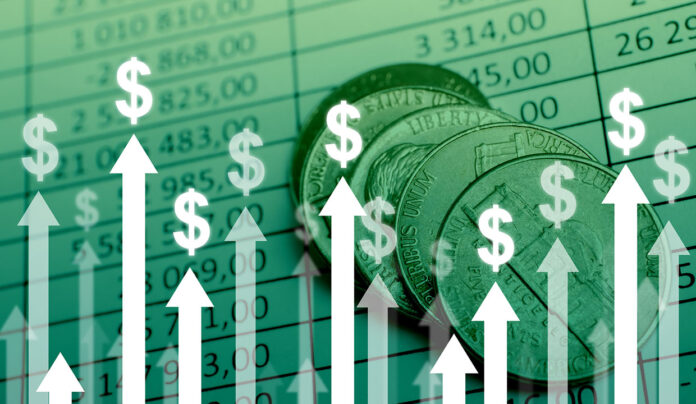Inflation is a serious economic issue that has the potential to destabilize countries and economies around the world. The US Federal Reserve warns of inflationary risks in the US, while China’s central bank predicts it will be 3% this year.
The inflation news is an article that discusses the inflationary effects of the US dollar. It covers how this has caused alarm around the world.
As a result of the relaxation of Covid-19 lockdowns, a spike in demand has been met with supply constraints and increasing energy and raw material costs, causing concern across the globe.
In several nations, the biggest consumer price rises in years have elicited a variety of reactions from central banks. More than a dozen have increased interest rates, but the Federal Reserve and the European Central Bank are the two that haven’t: the Federal Reserve and the European Central Bank.
Their different answers reflect their divergent perspectives on whether the price increase would fuel future inflation cycles or will instead fade away. Which viewpoint is correct will have a significant impact on the global economy’s trajectory in the next years.
The major central banks are counting on consumers to have confidence in their ability to keep inflation low, as well as the assumption that there would be enough underemployed workers to keep wage increases in check.
Other central banks are unsure whether they have gained that level of trust as inflation fighters, and perceive a greater danger of wage increases. In poorer nations, a greater proportion of expenditure goes to necessities like food and energy, which have experienced the most price increases, prompting policymakers to act more quickly to reduce inflation.
Chile’s central bank raised its interest rate by a quarter percentage point to 2.75 percent on Wednesday, shocking analysts with the country’s largest rate hike in 20 years.
“It’s impacted us so much, everything has increased,” said Sandra Valenzuela, a 46-year-old Santiago resident who lost her sales job last year and is now struggling to feed her family. “We have to change with the times.”
Her family has reduced their meat consumption since it is now too costly, and they are purchasing lower-cost brands of other products.
In March, global price increases picked up speed, pushing inflation rates higher than most central bankers had predicted. The annual rate of inflation in the Group of 20 biggest economies—which account for about four-fifths of global output—had reached a decade high by August.
The rise in inflation is being fueled by a mix of economic factors that few central bankers have seen before.
In the aftermath of an economic downturn, consumer demand has rebounded considerably sooner and much stronger than normal. However, supply has failed to keep up with demand. Few manufacturers have increased capacity during the Covid-19 epidemic, anticipating a more muted and drawn-out recovery, while industries and various sections of the worldwide transportation network have been hampered by government restrictions on labor and travel.
At a summit of the Group of 20 major countries in Washington, D.C. on Wednesday, central bankers said they anticipate supply and demand factors to balance out in the coming months, and that inflation rates would drop as a result.
Some of countries, most notably Brazil and Russia, have already increased key interest rates, having been among the first to do so in March. Other central banks have followed them as inflation has risen with no apparent end in sight.

Bengaluru, India’s wholesale vegetable market.
Dhiraj Singh/Bloomberg News photo
The Bank for International Settlements tracks 38 central banks, and 13 of them have increased their benchmark rate at least once. For the first time since the epidemic, the central banks of New Zealand, Poland, and Romania raised borrowing rates in October. Singapore, which tightens policy by increasing the value of its currency, joined the group on Thursday.
The main concern for all central bankers is that inflation gets entrenched when consumers begin to incorporate predictions of higher inflation into wage negotiations, and companies make the same assumption when setting pricing. There is a higher danger when memories of high inflation rates are fresher than in the United States and Western Europe.
“Emerging markets are becoming more hawkish since inflation expectations are likely to rise significantly,” said Bhanu Baweja, chief strategist at UBS Research.
Almost every nation in South America has seen very high inflation in recent memory, and prices are now again soaring there as new coronavirus infections decrease. Many families are in financial jeopardy as a result of salary increases that aren’t keeping pace.
Colombia and Peru, like Chile, are experiencing increasing costs following years of low inflation. As a result, both nations’ central banks have tightened their monetary policies as people struggle to make ends meet.
Cheese has experienced greater volatility than the rest of the food markets recently. However, pricing at supermarkets have stayed largely constant. Here’s why wholesale cheese pricing increases take a long time to reach consumers. Jacob Reynolds’ illustration
Peru, which had one of the worst economic downturns in Latin America in 2024, is dealing with the fastest rise in consumer prices in more than a decade. Since August, the central bank has been gradually increasing its reference interest rate, with a half-point rise to 1.5 percent in October. In September, Peru’s inflation rate was 5.2 percent.
Most contemporary central bankers follow a strategy based on the successful battle against very high inflation last seen in developed nations in the 1970s. They learn from that time that when salaries increase rapidly to keep up with inflation, prices will likely rise even faster, creating a vicious cycle.
Because there are few employees who can be hired to assist satisfy increasing demand in certain nations, the danger of a wage and price spiral is higher.
LET US KNOW WHAT YOU’RE CONCERNED ABOUT.
Are you concerned about rising prices? Why do you think that is? Participate in the discussion below.
This is especially problematic in Central Europe, where a number of central banks have recently increased their main interest rates. The number of employees has decreased due to emigration to wealthier Western Europe and low birthrates. Poland’s population may drop by more than a fifth by 2100, according to estimates by the European Union’s statistics office.
“One of the areas in the globe where we believe the danger of persistent higher inflation in the next few years is highest is Central and Eastern Europe,” said Liam Peach, an economist at Capital Economics.
The danger of a wage and price spiral seems to be lessening for Fed and ECB policymakers, who are relying on memories of a lengthy era of extremely low inflation to anchor consumer expectations of future price increases. Economists, notably Fed economist Jeremy Rudd, have lately questioned this notion, claiming that the data simply does not demonstrate expectations cause inflation.
Inflation has risen throughout most of Sub-Saharan Africa as food and energy costs have risen. In August, Ethiopia’s central bank increased its lending rate to commercial banks from 13 percent to 16 percent and quadrupled the cash-reserve ratio requirement to 10 percent.

In the United States, rising fuel costs have been a major cause of inflation.
Xinhua/Zuma Press photo
As a result of a combination of war, obstructed trade routes, and locust infestations, inflation in Sub-Saharan Africa’s biggest wheat producer soared to 30% in September, up from 26.4 percent the previous month.
Most Asian central banks are still wary of tightening monetary policy too soon for fear of jeopardizing weak economic recoveries that haven’t been aided by large-scale government stimulus.
Until now, Chinese manufacturers have absorbed increasing commodity prices, which has harmed their profitability. Factory-gate inflation in China jumped to 10.7% in September, the highest level in almost 25 years, thanks in part to increased coal costs. Consumer inflation in the nation increased by 0.7 percent, far below the stated goal of about 3%.
China’s central bank governor, Yi Gang, claimed the country’s inflation is “moderate” in general when speaking at the G-20 summit on Wednesday.
President Recep Tayyip Erdogan of Turkey dismissed three senior central bank employees last week. He has requested lower interest rates to spur economic development, which has investors worried that rate reduction would exacerbate inflationary pressures. According to Turkey’s official statistics office, yearly inflation reached 19.58 percent in September, the highest amount in 212 years.
Governments in other nations are reverting to policies that were popular in the 1970s but have since been abandoned in most countries. At response to increasing food costs, Argentina’s interior commerce minister, Roberto Feletti, imposed a 90-day price freeze on 1,247 items in shops on Wednesday.
He said, “We need to stop food costs from eroding wages.”
—This story was co-written by Nicholas Bariyo in Kampala, Uganda, and Jared Malsin in Istanbul.
Paul Hannon, Ryan Dube, and Stella Yifan Xie may be reached at paul.hannon@wsj.com, ryan.dube@dowjones.com, and stella.xie@wsj.com, respectively.
Dow Jones & Company, Inc. All Rights Reserved. Copyright 2024 Dow Jones & Company, Inc. 87990cbe856818d5eddac44c7b1cdeb8
The pce inflation is a topic that has been on the news. Inflation sets off alarms around the world due to the high costs of food and fuel.




